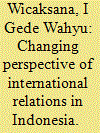|
|
|
Sort Order |
|
|
|
Items / Page
|
|
|
|
|
|
|
| Srl | Item |
| 1 |
ID:
159325


|
|
|
|
|
| Summary/Abstract |
This article explores the development of international relations (IR) in Indonesia with special focus on the changing trends in its theoretical perspectives. It argues that the academic works examined reflect the ways in which Indonesia’s IR scholars perceive and theorize the nature of the dynamics of external political environments and their connections to the state’s foreign relations. The argument is elaborated in two related parts. The first section discusses the theoretical perspectives that developed during the Cold War period, which focuses on the propensity toward historical realism and regionalism. The second part of the discussion examines recent developments in which Cold War perspectives have been reconsidered, and in many respects modified into three new categories of theoretical thinking, namely reform, resistance, and eclecticism. The changing theoretical trends reveal that Indonesia’s IR scholarship is open and innovative. The conclusion comments on the development of the Indonesia’s IR.
|
|
|
|
|
|
|
|
|
|
|
|
|
|
|
|
| 2 |
ID:
159327


|
|
|
|
|
| Summary/Abstract |
For the past two decades, North Korea has made a series of military provocations, destabilizing the regional security of East Asia. In particular, Pyongyang has launched several conventional attacks on South Korea. Although these attacks seem unpredictable and random, we attempt in this article to find some patterns in North Korean provocations. To this end, we employ a machine-learning technique to analyze news articles of the Korean Central News Agency (KCNA) from 1997 to 2013. Based on five key words (‘years,’ ‘signed,’ ‘assembly,’ ‘June,’ and ‘Japanese’), our model identifies North Korean provocations with 82% accuracy. Further investigation into these attack words and the contexts in which they appear produces significant insights into the ways in which we can detect North Korean provocations.
|
|
|
|
|
|
|
|
|
|
|
|
|
|
|
|
| 3 |
ID:
159329


|
|
|
|
|
| Summary/Abstract |
The establishment of the Trilateral Cooperation Secretariat (TCS) marks a milestone for China–Japan–South Korea trilateral cooperation in 2011. This article investigates the TCS’s foundation, structure, and policy influence within the broader context of trilateral cooperation. On one hand, the secretariat acts in many aspects as more than just a ‘secretariat’. It carries a wide range of mandates and is equipped with the potential for action. On the other hand, this study finds that the secretariat has not been developed to be a ‘strong’ and ‘good’ office. The TCS is granted limited autonomy, and has not developed a full-blown ‘independent character’. Its policy contribution has not yet extended to more targeted fields of functional cooperation. Furthermore, its exercise of agenda-setting remains limited as the TCS largely take their cue from the three governments. This study puts forward specific recommendations for the secretariat building in terms of institutional reform and capacity building.
|
|
|
|
|
|
|
|
|
|
|
|
|
|
|
|
| 4 |
ID:
159328


|
|
|
|
|
| Summary/Abstract |
In recent years, Japan's foreign policy elite has started to increasingly securitize China in their security discourse. The harsher tone from Tokyo is widely evaluated as a direct reaction to China’s own assertive behavior since 2009/2010. Yet, the change in the Japanese government’s rhetoric had started changing before 2010. In order to close this gap, the present article sheds light on an alternative causal variable that has been overlooked in the literature: a change in Japan’s security institutions, more specifically, the upgrade of the Defense Agency to the Ministry of Defense, in 2007. While utilizing discursive institutionalism and securitization-approaches, the present article demonstrates that a strong correlation indeed exists between the institutional shift and the change in Japan’s defense whitepapers in the 2007–10 period. It thus opens up a research avenue for the further scrutiny of the hitherto understudied but significant causal linkage in the study of contemporary Japanese security policy toward China.
|
|
|
|
|
|
|
|
|
|
|
|
|
|
|
|
| 5 |
ID:
159326


|
|
|
|
|
| Summary/Abstract |
Once considered severely under-institutionalized, East Asia has experienced a rapid process of institution-building since the end of the Cold War resulting in a significant degree of organizational overlap, both in membership and mandate. This paper examines the drivers and potential effects of institutional overlap in East Asia. It argues that the informal nature of Asian institutions coupled with competing visions of regionalism among member states make the region especially prone to overlapping regionalism. The consequences of such overlap for the time being have been positive. However, Asian policymakers must consider issues of institutional design to avoid steering the regional architecture in a direction which fosters regional rivalries and institutional competition in the long run. To illustrate the process of institutional overlap, I draw examples from a sub-set of regional organizations emerging out of the ASEAN family of institutions: the ASEAN+3, the East Asia Summit, and the Trilateral Cooperation Secretariat.
|
|
|
|
|
|
|
|
|
|
|
|
|
|
|
|
|
|
|
|
|